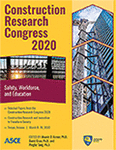Construction Research Congress 2020
Exploratory Analysis on Students’ Valued Skills in the Construction Industry
Publication: Construction Research Congress 2020: Safety, Workforce, and Education
ABSTRACT
With the evolving construction industry needs, the traditional engineering curriculum is limited in training construction professionals. The National Science Foundation latest reports indicate that industry valued skills are changing. Employers are interested in recruiting individuals with technical as well as contemporary and interdisciplinary abilities. The Associated General Contractors of America stated their concern about skilled professional supply. Workforce development has been of a growing interest in the industry. The need for administrative data to better understand construction graduates is growing, according to the National Academies. At the same time, student employability and retention are both focal points for universities, which makes the need for a students’ skills analysis as important as their demographics. This study suggests applying an exploratory analysis on students that have completed mandatory internships as part of their construction program at Arizona State University (ASU). The framework for the analysis is based on a literature review of social studies applied to construction programs. Variables such as scaled academic achievement, internship sector choice, and total grade attained on industry evaluation are part of the analyzed model. The collected data include scores on questions graded by direct evaluators from the companies as well as evaluations graded by the academic unit; reflecting each student’s performance based on recent student learning objectives as defined by the American Council for Construction Education. The results from this study show that the highest predictors of student success in the industry are ingenuity and creativity, punctuality and attendance, and lastly initiative. Finally, findings from this study can support decision makers in the employment process, and the final suggestions explore a novel approach to look at investment in students by industry partner companies.
Get full access to this article
View all available purchase options and get full access to this chapter.
REFERENCES
Bringle, G. R. and Hatcher, J. A., (1996). “Implementing Service Learning in Higher Education”. The Journal of Higher Education, 67 (2).
Cohen, J. (1988). “Statistical power analysis for the behavioral sciences” (2nd ed.). Hillsdale, NJ: Erlbaum.
Cohen, J., Cohen, P., West, S. G., & Aiken, L. S. (2003). “Applied multiple regression/correlation analysis for the behavioral sciences” (3rd ed.). Mahwah, NJ, US: Lawrence Erlbaum Associates Publishers.
Day, D. V. (2000). “Leadership development: a review in context.” The leadership Quarterly, 11(4), 581-613.
Dewey, J. (1939). “Experience, knowledge, and value: A rejoinder.” In J. A. Boydston (Ed.), John Dewey: The later works, 1939–1941, Vol. 14. Carbondale, IL: SIU Press.
Donhardt, G. L. (2004). “In search of the effects of academic achievement in post-graduation earnings.” Research in Higher Education, 45 (3).
Ericson, K. A., Krampe, R. T. and Tescher-Romer, C. (1993). “The role of deliberate practice in the acquisition of expert performance.” Psychological Review, 100, 363-406.
Felder, R. M. and Brent, R. (2016). “Teaching and learning STEM: a practical guide.”
Freeman, S., Eddy, S. L., McDonough, M., Smith, M. K., Okoroafor, N., Jordt, H., and Wenderoth, M. P. (2014). “Active learning increases student performance in STEM”. Proceedings of the National Academy of Sciences of the United States of America, 111 (23).
Healey, M., and Jenkins, A. (2000). “Kolb’s experiential learning theory and its application in geography in higher education.” Journal of Geography, 99, 185-195.
Jones, S. R., & Abes, E. S. (2004). “Enduring influences of service-learning on college students’ identity development.” Journal of College Student Development, 45 (2), 149-166.
Lewin, K. (1951). “Field Theory in Social Sciences.” New York: Harper & Row.
National Science Foundation, NSCG (2015). <https://www.nsf.gov/statistics/2018/nsb20181/data/sources>.
Piaget, J. (1964). “Cognitive development in children: development and learning.” Journal of Research in Science Teaching.
Roberts, D., & Ullom, C. (1989). “Student leadership program model.” NASPA Journal, 27 (1), 67-74.
Ryan, M., & Cassidy, J. R. (1996). “Internships and excellence.” Academic Search Premier, 82 (3).
Steffes, J. S. (2004). “Creative powerful learning environments beyond the classroom.” Academic Search Premier, 36 (3).
U.S. Burau of Labor Statistics, (2019). <https://www.bls.gov/ooh/construction-and-extraction/construction-laborers-and-helpers.htm>;.
Winstead, M. T. (1999). “Experiential education & construction engineering internships: Learning how to learn.” Division of Construction Engineering and Management, School of Civil Engineering, Purdue University.
Yoder, B.L., (2017). “Engineering by the numbers.” American Society for Engineering Education (ASEE), <www.asee.org/colleges>.
Information & Authors
Information
Published In
Construction Research Congress 2020: Safety, Workforce, and Education
Pages: 791 - 799
Editors: Mounir El Asmar, Ph.D., Arizona State University, David Grau, Ph.D., Arizona State University, and Pingbo Tang, Ph.D., Arizona State University
ISBN (Online): 978-0-7844-8287-2
Copyright
© 2020 American Society of Civil Engineers.
History
Published online: Nov 9, 2020
Published in print: Nov 9, 2020
Authors
Metrics & Citations
Metrics
Citations
Download citation
If you have the appropriate software installed, you can download article citation data to the citation manager of your choice. Simply select your manager software from the list below and click Download.
